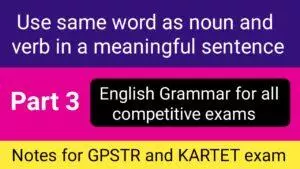
Same word used as noun and verb in a sentence in English grammar. Competitive English grammar for all competitive exams.
To get more video notes of English grammar visit our YouTube channel. This channel is very useful for all competitive exams.
📘 Applying the Same Word as a Noun and Verb: A Useful English Guide
🗣️ English has so many words that can be used as varying parts of speech—like converting verbs into nouns or reversing this.
👉 One useful example is applying the same word in a sentence both as a noun and as a verb. This not just exhibits versatility but also refines our writing ability.
💡 Why It Matters
✅ Identifying a word that is both a noun and a verb adds strength and interest to your message.
🔁 Instead of repeating similar-sounding words, using a combination of noun and verb forms keeps writing new and flexible.
✍️ It’s also helpful on exams or in situations where clearness is important.
✅ 20 Words Used as Both Noun and Verb — With Examples
1. Play
- 🎭 Noun: We saw a play at the theater.
- 🕹️ Verb: The children enjoy playing outside after school.
2. Love
- 💖 Noun: Her love of animals is inspiring.
- 💬 Verb: I love to read books on weekends.
3. Park
- 🌳 Noun: Let us go for a walk in the park.
- 🚗 Verb: Please park the vehicle close to the entrance.
4. Run
- 🏃 Noun: She took a morning run.
- 🏃♂️ Verb: He runs five kilometers daily.
5. Chat
- ☕ Noun: We had a lovely conversation over tea.
- 💬 Verb: They converse each evening before retiring.
6. Building
- 🏢 Noun: This building dates back more than 100 years.
- 👷 Verb: The laborers are constructing a new bridge.
7. Switch
- 💡 Noun: Flip the switch to illuminate the light.
- 🔄 Verb: You can switch positions if you prefer.
8. Lift
- 🛗 Noun: The lift is out of order today.
- 💪 Verb: Can you lift that box for me?
9. Judge
- ⚖️ Noun: The judge made the last decision.
- 🧐 Verb: Don’t rush to judge people.
10. Axe
- 🪓 Noun: He honed his axe before cutting wood.
- ❌ Verb: They chose to ax the old plan.
11. Record
- 🏅 Noun: She broke the world’s record.
- 🎙️ Verb: I will record the lecture for future reference.
12. Answer
- ✅ Noun: His answer was correct.
- 📞 Verb: Please answer the phone.
13. Watch
- ⌚ Noun: He wore a new watch to the interview.
- 📺 Verb: They transport the show every evening.
14. Promise
- 🤝 Noun: She kept her promise.
- 🗣️ Verb: I promise to be on time.
15. Damage
- 🔧 Noun: The damage was worse than expected.
- 🛑 Verb: Don’t damage the device.
16. Light
- 💡 Noun: The light was too bright.
- 🔥 Verb: Please light the candle.
17. Laugh
- 😂 Noun: His laugh made everyone smile.
- 😄 Verb: They laugh at all my jokes.
18. Transport
- 🚌 Noun: Public transport is convenient here.
- 🚚 Verb: Trucks carry commodities every day.
19. Object
- 📦 Noun: What is that metallic object?
- 🚫 Verb: I object to it.
20. Brush
- 🖌️ Noun: Clean the surface with a brush.
- 🦷 Verb: Don’t forget to brush your teeth.
🧠 Grammar Tip: Dual-Role Words
📌 This trick is effective because most English words have more than one grammatical function.
🧾 When you use them correctly, you demonstrate control over context, subtlety, and grammar.
✔️ Always make meaning clear through context.
❌ Don’t force it; use only dual-role words where they are a natural fit.
✍️ Doubling up on parts of speech adds conciseness and style to your writing.
🎯 Why Use It?
- 🎨 Variety & Engagement: Prevents repetition and boring prose.
- ⚡ Efficiency: Expresses both noun and action in one statement.
- 🧪 Clarity in Exams & Writing: Indicates that you know word functions.
✏️ Tips to Master This
- ✅ Construct a list of typical dual-role words: go, play, light, watch, run, promise, park, record, love, charge, object, switch, judge.
- 📝 Practice sentences combining roles naturally.
- 📚 Read extensively, observing how writers employ this technique.
- 🚫 Shun unnatural combinations and avoid forcing double usage.
- 👥 Have peers or instructors provide feedback.
🗯️ Although applying parts of speech as dual-role words can improve style, excessive use can produce clumsy combinations and forced use, eventually taking away from the writing’s clarity and effectiveness.
⚖️ One should use a balance between variety and clarity to properly connect with readers.
🧾 Summary
🧩 Employing a word as a noun and a verb is eye-catching and makes your writing more precise.
🗣️ It is a display of linguistic confidence and facilitates smoother, more interesting writing.
💡 Getting to know common ones (play, park, run, record) and exercising them in sentences is a great way to upgrade your English grammar.
🧑🏫 When informing her students about the phenomenon of homonyms, the English teacher wanted to play a game with them. She asked them to go outside and play in the park while she watched from a distance, taking notes for a record of their behavior.
✍️ Example Full Sentence
“I’ll record the game tonight and hope that our team beats the current record.”
Here, “record” is used both as:
- 🔊 the action (verb)
- 🏆 the accomplishment (noun)
⚠️ A counterexample:
“I saw a saw in the shed.”
In this, “saw” is both the tool (noun) and the act of seeing (verb)—which may create confusion.
📘 Start practicing this easy but effective trick—words multitask, and writing becomes more elegant and engaging as a result!
Watch this video for explanation of using same word as noun and verb.